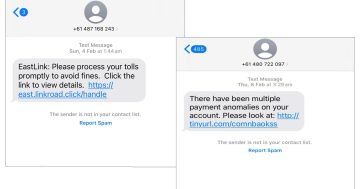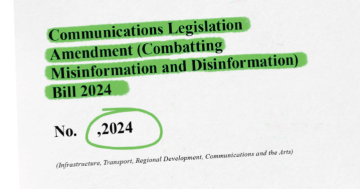
The Federal Government is elevating its fight against SMS scams. Photo: File.
An identification register the Federal Government hopes will help stop SMS scams by making telcos check where messages carried on their services are coming from is on its way.
SMS Sender ID Register, as it is known, will be an enforceable industry standard, requiring telecommunications providers to check whether messages being sent under a brand name correspond with the legitimate registered sender.
A pilot is already underway, and Communications Minister Michelle Rowland has directed the Australian Communications and Media Authority (ACMA) to develop the register to be fully operational by late 2025.
During the first half of next year, ACMA will consult on the industry standard, establish the systems and processes required to operate the register and provide a transition period for entities to submit and register their sender IDs.
The pilot register, which involved a number of network operators and major brands – including National Australia Bank, Commonwealth Bank and the Australian Taxation Office – registering their sender IDs, will continue while the consultation and development continues.
“The SMS Sender ID Register is an important tool to protect hard-working Australians from increasingly sophisticated and organised scammers,” Ms Rowland said.
“We’ve all received scam messages on our phones purporting to be from reputable sources – and it’s costing Australians millions of dollars every year.
“This mandatory register will enable these messages to be blocked or flagged as a scam – better-protecting consumers from being cheated.
“In this way, the register will also help restore trust in communications received from legitimate organisations and make Australia an even harder place for scammers to operate.”
If the Sender ID is not on the register, ACMA will either block the SMS or include a warning.
Under the new rules, telcos must also publish information to assist their customers in proactively managing and reporting scam calls, sharing information about scam calls with other telcos, and reporting identified scam calls to authorities.
The aim is that the register will help stop scammers from using the names of trusted brands, including banking institutions, service providers or government entities – like ANZ, Linkt or myGov – and deceiving Australians into thinking the scam messages are from reputable sources.
Assistant Treasurer Stephen Jones said the establishment of the mandatory register follows the passage of laws earlier this year and is informed by the voluntary pilot phase that tested the effectiveness of the register.
He said it forms part of a suite of measures to make Australia the toughest target in the world for scammers and bring losses down.
“Our coordinated approach to keeping Australians safe from scammers is among the most comprehensive in the world and the register will help to bolster our defences against the criminal scammers,” Mr Jones said.
“Scam text messages bombard Australians 24/7. The register will help to shut this down by disrupting the scammers’ business model.
“The government’s crackdown on scams is already showing signs of success, but it is not job done.
“We continue to work to ensure Australians have the best protections against these predatory and criminal scams.”
With SMS the most commonly reported scam delivery method, the register’s purpose is to provide greater protection to more consumers, as well as to legitimate brands and organisations impacted by scam activity. The 2023-24 Federal Budget provided $10 million through ACMA over four years to launch and maintain the register.
ACMA registered new rules on Monday (1 December) that require telcos to detect, trace and block scam calls.
A Reducing Scam Calls Code was developed by the telco industry on ACMA’s recommendation.
Chair of the ACMA’s Scam Telecommunications Action Taskforce, Fiona Cameron, said the code is a significant step towards providing better protections for consumers and making Australia a ‘hard target’ for scammers.
“The code is a unique and ground-breaking contribution to global regulatory efforts to prevent the harms caused by scammers. It is a holistic, end-to-end framework for effective scam reduction activity,” Ms Cameron said.
“There is no silver bullet to reduce scams, but these new rules place clear obligations on industry to do more to protect their customers and build confidence that it’s safe to answer a ringing phone.
“Scams have a devastating impact on their victims and scammers are unscrupulous in taking advantage of people. They quickly adapt to changing circumstances, as we have seen, for example, in scam activity targeting Australians during the COVID-19 pandemic.
“Industry’s initial efforts to block scams are an encouraging step towards the substantial and sustained work required before consumers will see a real reduction in scam calls.
“The end game is to stop scammers in their tracks wherever possible, and the ACMA will enforce this code to ensure that telcos meet their obligations to their customers.”


















